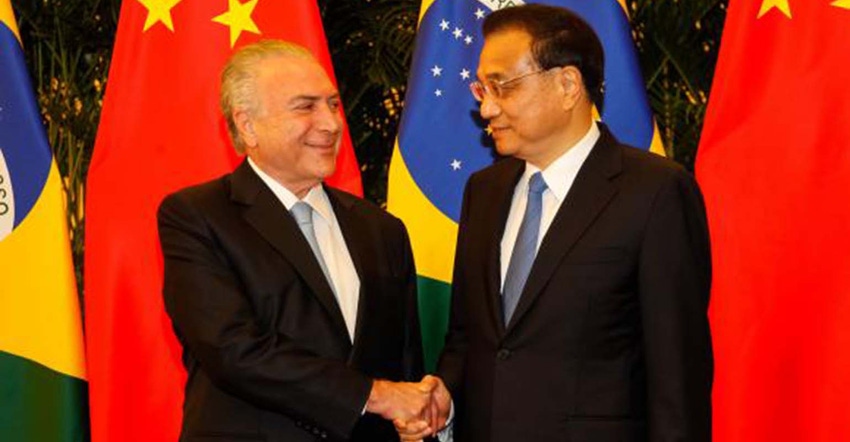
Trump Administration threats to slap tariffs on imported steel and aluminum could not just make the cost of a new pickup or combine higher: they could also threaten your China market.
Just look at a chart of the world’s top commodity exporters and you’ll see Brazil and the United States often sharing some of the top spots: soybeans, corn, ethanol, beef, broilers—and steel, interestingly, come to mind.
Some believe China could retaliate against the higher tariffs by targeting products mostly produced in some of the very states that gave their Electoral College votes to then-candidate Trump in 2016: and a lot of those red states produce soybeans.
Economics professor Paulo Roberto de Almeida, who also heads Brazil’s Foreign Relations Ministry’s International Relations Research Institute said of the tariff threat, “Aside from (a WTO complaint,) there could be immediate reaction. China, for example, is a big importer of American agricultural products. Maybe now China will want to buy a lot more soybeans from Brazil than from the United States.”
China is already Brazil’s top trading partner, with an estimated 43% of its soybean crop, 22% of its iron ore, and 15% of its crude oil going there.
If you look at any list of the world’s top commodity producers or exporters, the USA and Brazil often occupy first and second place—or are at least both in the top five. Take soybeans, corn, broilers, beef, pork, ethanol. And, in 2015 crude steel production, both countries are in the top ten, according to worldatlas.com (The fourth-placed U.S. produced 79 million tonnes that year, and eighth-place Brazil came in at eighth, with 33.25 million tonnes.)
China and Japan—big soybean buyers - were rated at numbers one and two on the list.
Making Brazil rich again
You would think Brazilians would love to see the U.S. establish the proposed steel and aluminum tariffs. After all, of the 176,820 tonnes of beans exported from Mato Grosso in January, 147,897 tonnes went to China.
But Brazil also shipped 4.7 million tonnes of raw steel to the U.S. last year, meaning about one-third of all the raw steel produced in Brazil being loaded on ships bound for the U.S. for further processing. And if Brazil were to send less steel to America, the $1 billion of coal the country imports from the U.S. to fuel its steel furnaces would likely drop.
It seems unlikely China would completely abandon the U.S. as a major source for soybeans. It wouldn’t make sense to put all their eggs in one basket. But I’m not hearing any farmer chatter celebrating the tariffs yet.
On the other hand, Brazil�’s aluminum industry is ready to cut back its 2018 growth forecast, and steel producers are preparing themselves for the need to compete in more markets for raw steel sales. The loss or reduction of Brazil’s top raw steel market could mean cheaper pickups, tractors and combines in coming years.
The opinions of the author are not necessarily those of Farm Futures or Farm Progress.
About the Author(s)
You May Also Like






